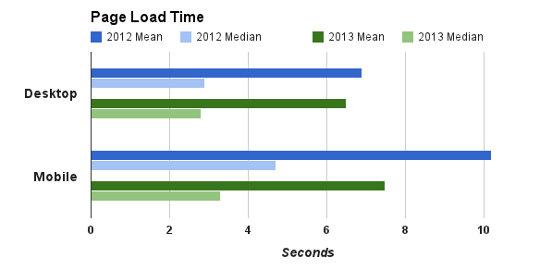 Google says it’s passionate about speed: the web getting faster. That’s very appropriate for a company that to this day, in spite of its minimalist design, still tells web searchers how long their query took for every single search.
Google says it’s passionate about speed: the web getting faster. That’s very appropriate for a company that to this day, in spite of its minimalist design, still tells web searchers how long their query took for every single search.
But it’s hard to make the web faster when web pages are growing in size: 75 percent bigger for e-commerce sites.
So Google checks, periodically, to see if the web is getting faster as our web browsers get better, mobile carriers continue LTE roll-outs, and mobile devices get more powerful. And apparently, in spite of the fact that e-commerce sites are perhaps over-indulging in images and complex Javascript and overall page size across the entire web is up 56 percent over the past year, the web is actually getting faster.
Especially on mobile. And especially in the U.S.
AI Weekly
The must-read newsletter for AI and Big Data industry written by Khari Johnson, Kyle Wiggers, and Seth Colaner.
Included with VentureBeat Insider and VentureBeat VIP memberships.
Desktop access is up only marginally, at average load time of just over six seconds per page, compared to almost seven seconds per page last year. Mobile access, however, is 30 percent faster than last year, with an average page load time of just over seven seconds, up from over 10 seconds last year.
That phenomenon is visible all over the globe, Google says, from countries with poor mobile internet infrastructure such as Nigeria, Egypt, India, and Brazil, to those countries with the fastest mobile internet, such as Japan, Sweden, Poland, the U.S., and Germany. In spite of the fact that page load times in Nigeria, for example, are over 10 seconds, they’re faster than last year’s. And Japan’s speedy three-second page loads this year are faster than its 3.5 second page loads last year.
Interestingly, the U.S. seems to be getting better, faster than the rest of the world.
The U.S. had a massive 40 percent mobile speed bump between April 2012 and April 2013, trailed by Finland with a 37.97 percent jump, and Germany, with a 36.17 percent increase. That’s impressive — apparently all the LTE roll-outs in the U.S. are having an impact. And it’s a major role-reversal, as we’re very used to hearing about how expensive and slow U.S. wired networks are in comparison to countries like Japan and South Korea.
Fastest-improving countries in terms of mobile browsing:
- U.S. – 40%
- Finland – 37.97%
- Germany – 36.17%
- Hungary – 33.96%
- China – 33.93%
- Mexico – 33.82%
- New Zealand – 32.69%
- Canada – 31.48%
- Philippines – 28.74%
- Argentina – 21.51%
All of those improvements add up to faster pages, a faster web, and — hopefully — less impatient mobile surfers.
Good luck with that one.
photo credit: Marxchivist via photopin cc
VentureBeat's mission is to be a digital town square for technical decision-makers to gain knowledge about transformative enterprise technology and transact. Learn More

